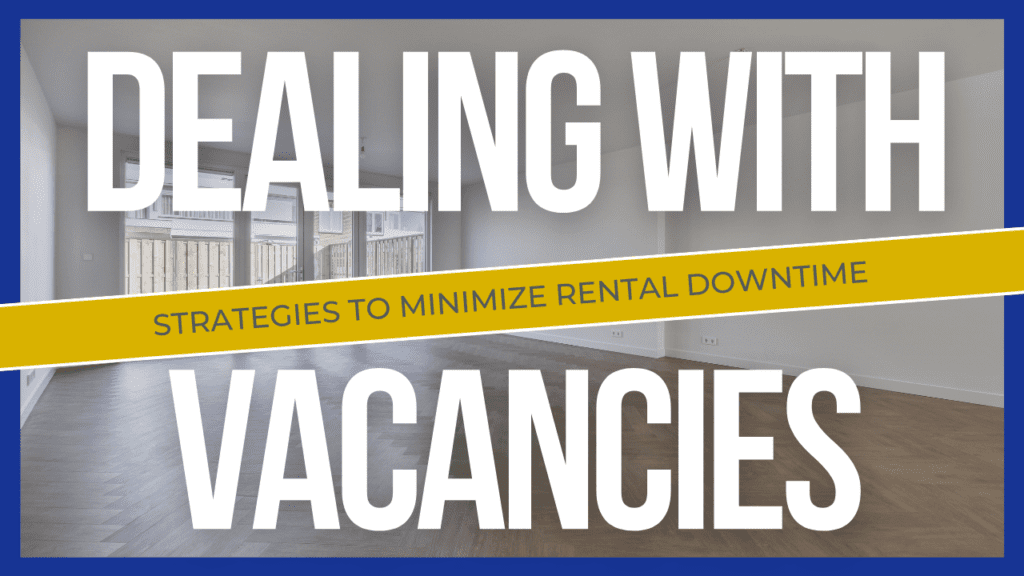
It’s more than just the money you’re losing.
Vacancies hurt for a lot of reasons. There’s the lack of rental income. But that’s not the only reason you don’t want to leave your property unoccupied for too long.
A vacant rental property poses both physical and financial risks. You want to minimize rental downtime as much as you can. We’re going to talk about some strategies to deal with and avoid vacancies. For example, a good leasing and tenant retention program will reduce the length and the cost of your vacancy and turnover periods. Ensuring that your property stands out in the rental market is important. Upgrades and updates will help you attract and retain those residents. The right pricing makes a difference, too.
Avoiding vacancy needs to be a priority when you’re renting out a home in Bellevue or other areas of Washington State. Let’s take an in-depth look at why it’s important and what you can do to avoid those agonizing downtimes.
We Don’t Like Vacancies. Here’s Why
You likely have your own list of reasons to be wringing your hands when a home doesn’t rent or an existing tenant gives you notice. In case you know some rental property owners who shrug off the threat of vacancy as no big deal, here are four reasons that it’s actually a very big deal.
|
You’ll Never Earn This Money Back The most clear and obvious risk to a vacant rental property is also its most disruptive: you don’t have any money coming in. There’s no one occupying your home, which means there is no one paying rent on that home. Your success depends on recurring and consistent monthly income. When you lose that – even for a month or two – it’s money that you’ll never recover as an owner. Vacancy loss hurts your short-term cash flow and your long term returns. You’ll want to budget for potential vacancies before you decide to purchase an investment property or rent out your home. Minimizing the days or weeks or months that you don’t have rental income is an important part of successful real estate investing. |
You Still Have Expenses to Cover Not only is money not coming in when your rental property is vacant, you’ll also find that with a vacant rental property, you’re still paying for its upkeep. Those out-of-pocket bills will start showing up for things like:
You have to keep the lights on and the water running when the property is unoccupied so you can show it and perform necessary repairs or updates. All of these expenses are typically absorbed into the rental payments you collect, but your vacant property means that you must pay for these things on your own. |
|
Vacant Homes Look Like Opportunities to Opportunists Outside of the money you’re losing and spending, vacancy is materially bad for your property. You never want your property to be the target of criminals and thieves. However, vacant properties are always more likely to attract vandals, thieves who target air conditioning units and appliances, trespassers, and rental scams. People could break into your property without anyone there to notice it. You need to avoid this and take the necessary steps to secure your rental home when it’s vacant. Install security features such as video doorbells or cameras, and change the locks after tenants move out. There’s no way of knowing who has a key. Maybe install a digital lock or keypad instead so you can control access. |
And Then There’s the Risk of Deferred Maintenance Another risk that a lot of landlords and even experienced real estate investors don’t think about is the risk of property damage from unknown maintenance needs. An undetected leak or a drafty window is far more likely to go unnoticed when you don’t have someone in the home to notice it. There’s not a tenant in place who can tell you that a sink is leaking or a door is off its hinges. You won’t know if the heat is failing or if a storm has blown a tree onto the roof. This can lead to expensive repairs. A longer vacancy will often require more maintenance. Try to get someone inside the property every few days to check on things when there’s no one renting it. |
We know that vacancy is stressful and costly for rental property owners because of all these reasons. So, let’s talk about how you can reduce and manage the vacancies that always seem to be looming.
|
Hot Tip: Working with a professional property management company is an excellent way to protect your investment against these long vacancy periods and the risks that come with them. |
Avoiding Vacancy with Competitive Pricing and Stunning Property Condition

This will probably not surprise you, but we’ve found that longer vacancies are usually due to one of these three things:
- The property is priced much higher than the market will allow.
- The property condition, unfortunately, leaves a lot to be desired and no one wants to live there.
- Lackluster marketing and advertising leaves absolutely no one calling up with questions or showing requests.
The marketing and advertising component is a big part of avoiding vacancy, and we’re going to dive into that a little bit more in a page or two. But right now, let’s focus on two essential topics that need consideration before you even list your home for rent.
Pricing + Condition
Pricing. Everyone has an idea of what they want their rental home to earn.
It doesn’t mean much, considering the market has much more to say.
Your rental value has to be accurate and competitive and aligned with the market, otherwise the property will remain vacant. If your price point is outside of what the market demands, you’re going to have to be flexible, otherwise you can expect a long and painful vacancy period.
Not only is that a long and painful vacancy period – it’s an expensive one. If you’re holding out for a higher rent, you may not be aware of how much money you’re actually losing on the rent that’s not coming in.
Make sure your rental value is where it should be. You can conduct a rental market analysis to establish what similar properties are renting for. A better idea is to talk with a property manager who has a good sense of the market and can analyze what your property is worth. As property managers, we’re constantly collecting data and looking at analytics to understand the market and the competing properties in your neighborhood. We can tell you what good tenants are willing to pay for a rental home like yours, pricing your property for profit and a speedy leasing process.
Working with the data that’s provided by a property manager is far more reliable than scouring online sites like Zillow or Craigslist.
Property condition is just as important as pricing.
As you are preparing your property for the market, the best way to avoid vacancy is to ensure that you’re offering tenants a home they’ll want to live in. When your price is accurate and competitive and people are coming to see your home but they’re not interested in filling out an application, the problem is likely that it does not appeal to them.
Why does it not appeal to them?
That’s the question you have to answer in order to end the vacancy and place a good renter.
Well-qualified tenants know that they have a lot of options when it comes to being approved for a rental home; they’re not going to choose the home with the faded and stained carpet or the deteriorating appliances and the chipping paint.
Good tenants are looking for:
- Modern, energy-efficient appliances
- Curb appeal that includes simple, clean landscaping
- Smart home technology
- Pet-friendly policies
- A floor plan that supports their working and living priorities
Be willing to make some upgrades and improvements if you want to minimize vacancy and attract good tenants quickly. Not sure which upgrades are worth your resources? Again, study the market. Take a look at what competing properties are offering. Do all the other rental homes have hard surface floors, and you’re the only property on the market with carpet? That could be why tenants are avoiding your property.
Again – your property management partner can save you time and frustration by making recommendations that match the market and your investment goals. Talk about where you can improve your property and how you can make it more attractive to the good tenants who are looking for their next home.
Market Your Rental Property Better to Avoid Vacancy

When your price is right, your condition is appealing, and you still cannot seem to get a tenant interested in your property, it’s possible that there isn’t enough attention being placed on your home for rent.
Make more of an effort to market and advertise your rental home.
Some questions to ask yourself about your existing marketing strategy:
- Are you using all of the most popular rental websites?
- Are you leveraging a solid social media presence?
- How good are your photos?
- Are you sharing enough information?
- Is it easy for prospective tenants to schedule a showing?
- Are you being responsive when people call or message?
You need a strong presence online if you want to avoid vacancy and rent your property quickly. As property managers, we start with our own website. You may not have your own site. That means you have to be more active on other sites and social media platforms. The idea is to showcase your property for rent and make sure it gets a lot of attention.
The experience we’ve gathered leasing homes over the years tells us that an effective marketing strategy includes the following items:
| High quality photographs | Concise but thorough information | Responsiveness when prospective tenants call for more information |
| Video tours and walk-throughs | Invitations to showings that are convenient for tenants | Easily shareable posts on social media. |
You need a lot of photos, and they have to be good photos. Make sure you’re showing off your bedrooms, bathrooms, the kitchen and all of its appliances, and any outdoor space. Take close-ups of any updates or improvements you’ve recently made. Include pictures of special features, whether it’s an attached garage on a single-family home or an in-unit laundry set up in a multi-family property. Advertise your energy-efficient features or your smart home technology.
You might have the best, most impressive rental property in all of Washington State. If no one knows that it’s for rent, of course you’re going to experience a vacancy that’s just a bit too long.
Make marketing a priority.
Did You Know That Pet-Friendly Properties Rent Faster?
 If your listing is pretty clear about no pets being allowed, that might explain your longer-than-desired vacancy.
If your listing is pretty clear about no pets being allowed, that might explain your longer-than-desired vacancy.
People love their pets, and it won’t surprise you to know that more than half of the renters looking for homes have at least one pet.
You’re eliminating over half of your pool of potential renters when you don’t allow pets.
We’re not suggesting that you open your doors to a litter of kittens or a pack of Pit Bulls. But, when you’re willing to consider pets, you’re going to inspire a lot more interest in your rental property.
Worried about your property and the potential damage, odors, and nonsense that may ensue when a dog or a cat is in residence? A strong pet policy can help protect you. Pet screening is a good idea, too.
Avoid long vacancies by considering pets. You’ll notice your rent your property faster, and you’re more likely to retain the tenants that you do place.
Avoid Vacancy with Tenant Retention
It’s simple common sense: one of the best ways to avoid vacancy is by holding onto the tenants who are already in place. When your residents renew their lease agreements year after year, you don’t even have to think about the dangers and risks and loss that come with a long vacancy.
It’s a non-issue.
Retention should be a priority, and when it is, you enjoy higher profits and less stress.
Retaining tenants and avoiding vacancy means creating a positive rental experience. You should know how to do this, but if you don’t – here’s a refresher:
| Provide a clear set of expectations at move-in.
Retention begins before your residents are even in place. Make sure they know how to have a successful and pleasant rental experience. |
Respond to maintenance needs promptly and with a sense of urgency.
Tenants will quickly grow frustrated when their repair requests are ignored or fumbled. Be responsive and proactive. |
| Communicate well, and be available and accessible.
Tenants want to be heard, so make sure you’re listening, especially when they have a concern or a complaint. |
Offer conveniences
Renting from you should be easy, not difficult. Make sure you have convenient systems in place, such as online rental payments and maintenance requests. |
| Protect their peace and privacy.
You should check in once in a while to make sure your tenants are having a good experience. But, don’t be the landlord who shows up unannounced. Leave them to their private and quiet enjoyment of their home. |
Keep renewal rent increases reasonable and market-driven.
Most tenants expect that the rent will go up when it’s time to renew a lease agreement. That doesn’t mean you have to chase them away with excessive rent hikes. |
Avoid Turnover.
Vacancies that are created by a tenant moving out are often even more expensive than the vacancies you deal with when you’re first preparing to list a home on the market. The entire turnover process comes with costs that are often much higher than expected. You’ll likely have to paint, consider improvements and upgrades, spend money on marketing, and spend time showing the home and screening tenants.
What To Do With Vacancy Times
We definitely want to minimize your vacancy time. As we have explained, they’re expensive and risky. These good ideas we have shared will hopefully help you take some strategic approaches to the way you prepare your property, price it, market your home, and retain your tenants.
But, keeping your rental home 100 percent occupied for the entire time you own the home is nearly impossible. There will be vacancies. What should you do with that time?
Make good use of it.
This is when you should be making updates and upgrades. Putting fresh paint on the walls and installing better floors. Look for ways to make your property more efficient and less costly. Spend time on landscaping and curb appeal.
Vacancy does not have to be a complete loss.
These are our general tips for avoiding vacancy. We’d be happy to customize some ideas based on your unique location, property, and goals. Let’s talk about it. Please contact us at Real Estate Gladiators. We serve Monroe, Issaquah, Bellevue, Everett, Lake Stevens, Kirkland, and other cities in and around King and Snohomish counties in Washington State.
